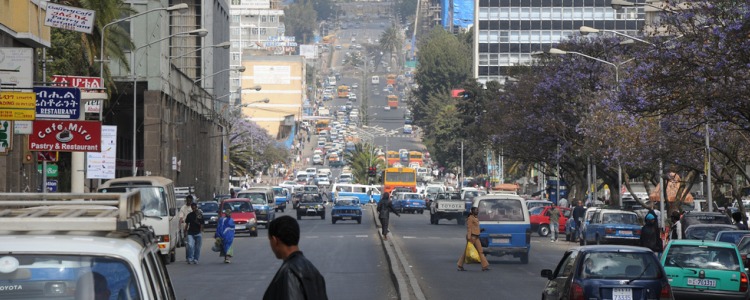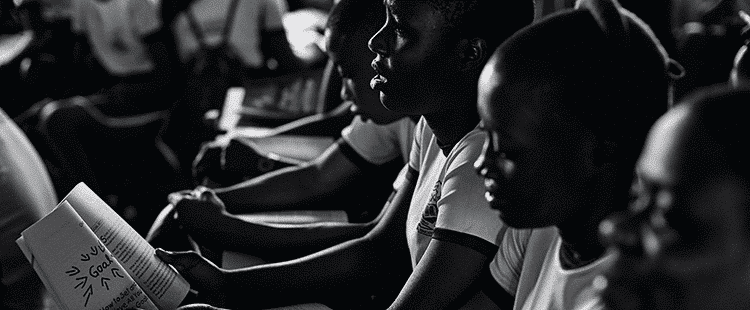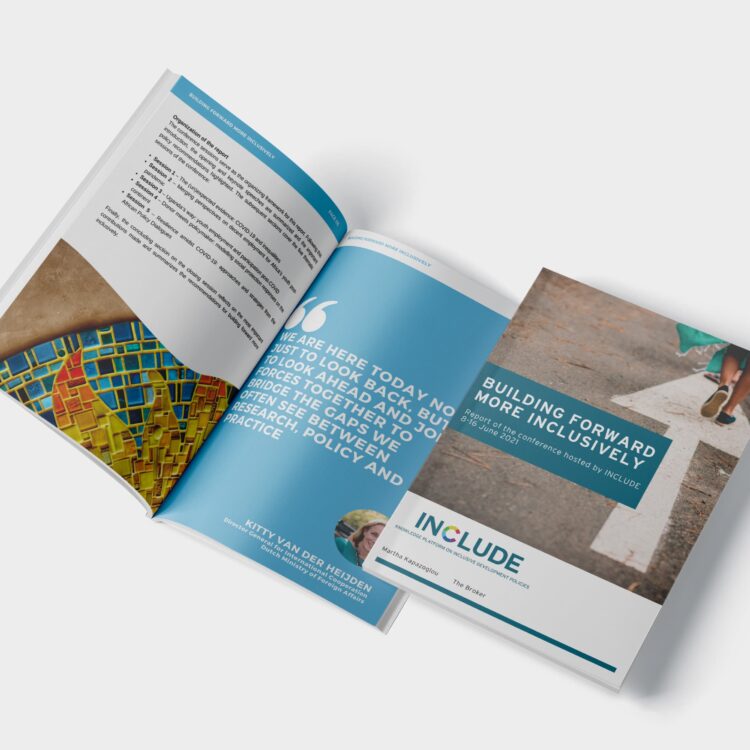
A major reason why less developed countries fail to develop is the structural exclusion of large segments of their population from their economic, social and political development. In my estimation, roughly three billion people—one out of every two in the developing world—face discrimination in how their governments and markets work. This institutional bias has a dramatic impact on access to education, security and the rule of law, and to opportunities to advance.
In the discussion on inclusive societies: read the opposing responses to Seth Kaplan by Frauke de Weijer and Cedric de Coning at The Broker.
Institutional bias and social cohesion
Institutional bias—a product of governments and markets that advantage the rich and powerful at the expense of everyone else—is so widespread and its impact so powerful in less-developed countries because of the nature of their societies. Weak government and divided populations combine to create a governing system that inevitably produces inequitable social relationships and self-interested politics that work against the interests of the weak and deprived. And the two factors reinforce each other in a poisonous mix that has long-term effects on how countries are governed, and how the poor live.
Rule by exclusion
In contrast to more cohesive countries, where elites feel that the poor are ‘one of them’ (and therefore have an obligation to act on their behalf), or in countries with more effective institutions, where elites are held accountable for their actions (and therefore have an incentive to act more inclusively), the rich and powerful in these places have little reason to care about the poor. They feel that they have little or nothing in common with their poorer compatriots, and see little point in helping the poor participate as full citizens in the social, economic and political life of the country. And the elites are often not only indifferent to the fate of the poor, they often deliberately exclude them by manipulating weak governments in ways that work against the poor’s interests. Once established, these attitudes and practices can become ingrained in the political culture—perpetuating themselves over generations.
Rule by exclusion naturally produces a high degree of economic and social exclusion (and ‘adverse incorporation’) that limits access to all kinds of public services and opportunities to advance. The overall effect has severe consequences for its victims. In Brazil, for instance, nearly three times as many black women die from the complications of pregnancy and childbirth as white women. In Bolivia, the poverty rate among the non-white population is more than double—37 to 17 percent—that of the white population. And in Vietnam, the government estimates that 90 percent of the poverty in the country is concentrated within ethnic minorities.
Of course social divisions by themselves do not cause inequities. Every market economy has them. But where societies are weakly integrated, such inequities are likely to be far greater because the mechanisms for spreading wealth—markets and governments—break down.
The combination of inequality and exclusion both creates and perpetuates poverty. Starting with little income and meagre assets, the poor are excluded from the resources, opportunities, information and social networks necessary to improve their situation. Imbalanced distribution of public spending, unfair laws that privilege one group over another, and officials beholden to powerful interests all play their role. Discrimination in land and water rights, access to schools and financial institutions, and job markets all work to reduce the scope for the poor to use their own initiative to improve their circumstances. Referring to a powerful few in her Bangladeshi village, Rahima says “the canal belongs to them. No one can fish there or bathe cattle.
Inclusive development in fragile states
In my recent book on poverty and inclusive development, I look for ways to change these dynamics. I mainly focus on fragile states, working from two assumptions: 1. governments do not work well, and are easily corrupted or hijacked by powerful interests; and 2. societies are divided into many different identity groups based on ethnic, religious, caste, clan or class differences. Weak economies exacerbate these problems, making the competition for power more zero-sum (as the levers of the state are a major source of income). A weak civil society limits the options for change from below.
These assumptions change the way you analyze problems. You cannot assume that even regular elections will promote accountability and encourage leaders to introduce broadly beneficial policies. Often they are rigged, or are determined by vote buying or ethnic ties. In countries like Pakistan, for example, changes in administrations do not change the dynamic of elite-dominated politics.
What Nuhu Ribadu, former chairman of the Economic and Financial Crimes Commission in Nigeria, says about his country can be said about many poor countries around the world:
The political culture of Nigeria masquerades as a democracy, but in reality is no more than an exclusive club for a tiny elite accountable not to the millions of citizens they, in theory, represent but to an even smaller clique of power brokers, barons, and what we now inelegantly call godfathers. . . . Imagine a system where everything that is supposed to help to strengthen the state and uphold the rule of law is instead compromised and undermines it. This is true in Nigeria, but also in Cameroon, Sudan, the Democratic Republic of the Congo (DRC), and most African nations.
Similarly, you cannot assume that economic reforms will produce competitive markets because of great differences in access to regulators, skills and money. Rules may be sound, growth may be fast, but most of the population may not be benefitting, as was the case in Egypt before the Arab Spring and many countries across Africa.
Given such conditions, I look at power dynamics and the role of elites and then seek ways to make the latter work more for the benefit of their countries and populations.
The challenges are great, as even enlightened individuals face many obstacles—some petty, some substantial—when they try to promote an inclusive state-building agenda. Corrupt bureaucrats, self-serving politicians, regional powerbrokers, ethnic and religious leaders preaching gospels of prejudice and exclusivity: Individually and collectively, they will try to disarm or destroy anyone working to foster change.
But enlightened individuals within countries seeking to encourage more inclusive behaviour from elites are not without their own weapons. They have a trio of tools at their disposal with which they can try to advance their agenda (see box).
Tools for inclusive elite behavior
- Social cohesion —that is, the social, cultural, and psychological bonds tying all members of a society together. The more socially cohesive a state is, the more likely its leadership will act inclusively, see growth-inducing policies as in its interests, and invest in strengthening the capacity of the state.
- An inclusive pro-development ideology, a worldview that explicitly calls upon all members of a society to help each other, including the poor, and to promote pro-growth policies.
- Steps that can shape the incentives influencing members of the ruling clique, encouraging them to come together behind an inclusive pro-development agenda.
Social Cohesion: The Glue That Binds
The countries most likely to prioritize inclusive development are nation-states. A nation-state is naturally cohesive, its people sharing a common history, language, culture and social system. These ties daily strengthen the sense of common identity and group allegiance. The attitudes that this sense of a common destiny produces translate into governments that are both more oriented toward development and more concerned for the welfare of the poor.
Nation-states are common in the developed world but are relatively rare in the developing world, because the borders of states were created by colonial mapmakers, not by the people who lived in them. Where they exist, however, they tend to be far more cohesive and unified than the countries around them. By virtue of being based on a common identity, nation-states experience fewer identity-driven rivalries than are found in the rest of the developing world. They are also more resilient, better able to unite in the face of adversity rather than break down into competing factions. They are thus also less prone to conflict.
Fewer fissures also mean that fewer people are likely to be denied public services and equitable treatment at the hands of the state. Elites that see the poor as ‘one of us’ are far more likely to ensure that they have access to schooling, employment, infrastructure, security and opportunity.
Examples of action towards achieving inclusive societies
China is one of the best examples of this process in action on a large scale. At least 90 percent of its population shares a strong national identity based on thousands of years of common social, economic and political evolution. Despite some internal divisions and a huge population, it is one of the more cohesive states in the developing world. As a result, it has been able to call upon deep reserves of group affinity to make modernization a national mission in recent decades. The contrast with a country like Nigeria—which has more than 200 different ethnic groups, conflicts over religion, and a very short history—could not be greater.
But even nation-states cannot afford to take social cohesion for granted. They need to take steps to reaffirm and bolster it. And states that are not nation-states must, of course, do far more. They must create what does not exist or what exists only weakly, and then nurture and strengthen it. Singapore has relentlessly and systematically laboured to construct a cohesive unity from three ethnic groups (Chinese, Malay and Indian), which found themselves at odds in the wake of independence in 1965. The new country’s leadership wisely opted to focus on equity in public services, education, inclusive growth and other policies that raised living standards and promoted social integration. As a consequence, Singapore is today a model of stability and prosperity. The country’s founding father, Lee Kuan Yew, is confident that his country’s success is due to building “social cohesion through sharing the benefits of progress, equal opportunities for all and meritocracy, with the best man or woman for the job, especially as leaders in government.”1
Leaders in some Latin American countries have come to recognize the importance of social cohesion to stability and growth in recent years, belatedly reversing centuries of exclusion and neglect of their mainly non-white poor. According to a UN booklet on the region, “In Latin America and the Caribbean, the idea of social cohesion has emerged as a response to persistent problems which, despite certain achievements over the past few years, continue to exist: high indices of poverty and indigence, the extreme inequality that characterizes our region and various forms of discrimination and social exclusion dating back to the distant past. . . . While there are usually many reasons for these gaps, the frail material foundation of social cohesion is a stand-out factor.”2
One of the most demanding efforts to foster social cohesion is taking place in Rwanda, which was torn apart by genocide in 1994, when 800,000 members of the country’s Hutu population were slaughtered by their Tutsi neighbours. Rwanda’s president, Paul Kagame, is trying to cultivate a national identity to serve as a foundation for social cohesion:
Nation-building is a long and challenging political process, but one that leaders, together with the citizenry, must undertake with seriousness. We must understand that most nations have their unique circumstances and each one, throughout history, has built and developed itself around certain distinguishing core features. The first of these has always been the conscious cultivation of a national identity, the sense of belonging, based on shared values, tradition, history and aspirations. National identity is the foundation of social cohesion. . . . to correct a historical wrong and institute inclusive politics. The Rwandan people learned the hard way the danger of politics of exclusion where the winner takes all, and have opted for a model that builds on inclusive politics of power sharing and consensus building.
National leaders have tried to use a variety of unifying forces to overcome the problems posed by ethnic and religious diversity within their country’s borders. Tanzania has adopted Swahili as its national language; Senegal has celebrated its unique Islamic and African cultural heritages; Pakistan has attempted to forge an Islamic identity.The efforts to build a common identity described in the box can succeed only if they are multigenerational and multidimensional. The young must be educated from an early age in languages, symbols and ideas that everyone within the country can accept. The media must cultivate a shared self-image and show a population how it differs from its neighbours. Government officials must consistently refrain from displaying favouritism toward any group. Steps must be taken to institutionalize cooperation between the country’s different ethnic and religious groups.
None of this is likely to be achieved easily or without opposition. In states that lack a sense of national identity, the ties that bind individuals to their own groups are powerful. ‘Spoilers’—those who seek to wreck efforts at reform—will try to undermine unity by appealing to ethnic, religious, tribal or clan divisions. But each enlightened member of the elite can resist spoilers and promote cohesion in his or her own sphere of influence. A television producer can create programmes that promote a common culture. A leader of a political, economic or social group can make its activities and membership more inclusive. A teacher can work to eliminate prejudice among students. A public official can try to ensure that schools are funded equitably throughout the country. A judge offered a bribe to rule against a disadvantaged group can refuse to accept it.
Inclusive Ideologies
While the process of building social cohesion takes generations, inclusive ideologies can impact the thinking and behaviour of elites within decades, even years, inspiring concrete action to help the poor.
One of the best historical examples of an ideological impulse that helped the poor can be found in those countries that have embraced the ‘developmental state’ ideology pioneered by Germany and Japan in the nineteenth century and since adopted and adapted by countries as diverse as China, Singapore and Rwanda. This ideology centres on a national modernizing mission driven by inclusive growth and building up the state in ways thought to quicken economic transformation.
By emphasizing the need for unity in the face of external threats and promising faster growth that will enrich both the elites and the masses, the leaders of these countries have been able to put together broad coalitions and push through major reforms that some powerful interests might otherwise have been able to obstruct. Although the developmental state ideologyhas often led to some unsavoury practices (such as the repression of opponents), it has also consistently yielded governments that see great value in education, basic healthcare, infrastructure, entrepreneurship, wealth creation and a robust government apparatus—all of which benefit the poor tremendously. It also extols the value of social cohesion, which is why many of the same states that embrace the developmental state approach also actively promote social cohesion.
By providing ample benefits in exchange for loyalty to the state and the developmental model, the developmental state ideology has helped defuse potentially divisive ethnic, religious and geographical divisions. It has also reduced the incentive for anyone to develop and disseminate an alternative ideology, one likely to produce division, exclusion and destabilization. Growth begets growth, itself becoming a driver of change. The greater the opportunity to make money legitimately, the readier people will be to turn away from exclusionary politics and corrupt practices.
The power of political, religious or cultural precepts can be harnessed in numerous ways. For instance, members of the elite who want to nurture more inclusive and development-oriented states could take a number of steps (see box).
Steps for inclusive and devleopment-oriented states
- Work together with other prominent members of the elite to develop a national vision of unity and progress.
- Urge opinion leaders who have the ear of the top members of the elite to emphasize that promoting inclusive development is the duty of any responsible leader. Muslim and Christian clerics, for example, could be encouraged to take a hard line against any individual who repeatedly acts in ways that harm the poor or the development of society.
- Establish a governance academy where both current and future leaders can be not only educated in public administration but also imbued with a sense of duty to adopt and implement inclusive pro-development policies.
- Institute a financially attractive ‘governance prize’ that can be awarded with much fanfare to a number of public servants every year for their work on behalf of the poor and good government.
- Partner with leaders of neighbouring countries or regional organizations to espouse a more inclusive development model. Peer pressure can be very powerful—which is one reason why in 2007 tycoon Mo Ibrahim created the Ibrahim Index of African Governance, which measures the quality of government on the continent and aims to pressure leaders to raise performance.
Incentives
Even the most inspirational and eloquent of leaders can do only so much to persuade members of the elite to embrace inclusive development as an idea. Inclusive leaders have to find creative ways to reconfigure the incentives that currently make many members of the elite hostile toward development and social inclusion.
Different circumstances call for different strategies. Where a state is relatively robust, a pro-reform coalition may be able to negotiate with opponents to accept a pro-growth deal. Offering compensation, whether financial or in some other form, may help to bring potential spoilers on board. Various forms of popular pressure—from taxpayer protests to campaigns by coalitions—may also overcome elite resistance to change. But where the state is weak and society is fragmented into a series of patronage networks, the pro-reform group may have to be much more creative if they are to co-opt powerful forces.
Latin American countries like Brazil, Argentina, Chile and Mexico offer good examples of how reform coalitions can be constructed in relatively robust states. Each was able to make politically difficult market-oriented reforms (such as trade liberalization, privatization and the reduction of subsidies) in the late 1990s. The advent of economic crisis—brought on by the Asian financial crisis—spurred events, but significantly changing the regulatory environment of the previous 40 years would not have been possible without the development of a broad consensus among important actors. A substantial shift in both elite preferences and the opinions of ordinary voters—important as the countries democratized—helped forge a consensus in favour of policy reform.
In the end, enough influential members of the elite—including politicians, union leaders, and well-placed businesspeople—became convinced of the need for the reforms and had enough backing within their constituencies to support them. The net result was both a surge in growth and a marked reduction in poverty in the countries that sustained their reforms over time.
Indonesia under Suharto shows how reform coalitions can be constructed in less robust states. The role of local businesses was extremely important. Suharto was able to fashion a stable, fast-growing regime based on an alliance committed to inclusive development between himself, the military and business within a relatively short period. Corruption was widespread, but major investment projects were protected by a system of centralized bribe collecting that protected property rights, reduced uncertainty about costs, and even ensured a degree of predictability concerning returns.
Simultaneously, the regime sought to court the rural masses (who had supported the previous government) and introduced policies that helped the poor. Between 1966 and 1997, Indonesia was one of the fastest-expanding economies in the world, creating millions of manufacturing jobs, becoming self-sufficient in rice, and achieving major advances in education and literacy. Incomes grew at 4.5 percent a year between 1965 and 1990, while the proportion of Indonesians living in poverty fell from almost two-thirds in 1975 to just over one-tenth in 1995.
How can business, community and religious leaders persuade political leaders to act more inclusively? How can pro-reform forces grow larger, stronger and more cohesive? How can they use their power to change the incentives shaping those who control power? Many options present themselves:
- Encouraging leaders to create a legacy that future generations both at home and abroad will applaud.
- Creating partnerships between business associations, political parties and trade unions to promote a pro-growth agenda that benefits a wide range of people, as occurred in several Latin American countries in the late 1990s.
- Developing a network of reform advocates from across the political spectrum to share ideas, forge new relationships, and work together toward common goals.
- Uniting dispersed, disaggregated, and therefore weak, political forces into a stronger, consolidated movement that can press for policies that benefit the poor, such as better schooling and more rural roads. Indigenous groups have banded together in the Andes countries to create large political parties (and other groupings) with enough clout to force governments to introduce inclusive policies.
- Reorienting political parties, business associations or activist groups currently structured around patronage, ethnic or regional bases toward an issue or interest-based agenda that encompasses a broader grouping of people.
- Strengthening mechanisms that hold leaders accountable for their actions. Establishing nongovernmental organizations that monitor public policy, spending, corruption and inequities in public expenditures can increase transparency and give the public greater ability to influence their leaders. So can strengthening independent media and the skills of investigative journalists.
Combining the Three Tools
These three tools for persuading elites to adopt an inclusive state-building agenda can be used separately but have much more effect when combined. After all, they are mutually reinforcing. Reform champions need to determine what tools they have available and how best to use them.
They can do this by asking questions about the people whose support they need: What interests do key members of the elite share with the poor? How can the elite be encouraged to act more inclusively and to adopt a long-term development-oriented perspective? What is shaping the relationship between politicians and investors and how might their common interests be funnelled towards productive investment? What ideology might be used to help spur action toward more inclusive and development-oriented behaviour? What common elements (language, history, etc.) might be used to strengthen national cohesion? What are the elite’s major sources of income and prestige and how might these be better used to encourage more inclusive publicly minded action?
Answers to these questions should be factored into the development of a practical plan that promises to spur inclusive development, rewards the elite enough so they stay committed to the process, and starts a virtuous circle that can benefit more and more people over time.
Footnotes
- Lee Kuan Yew (2000), From Third World to First: The Singapore Story: 1965-2000, New York: HarperCollins. p. 691.
- United Nations Economic Commission for Latin America (2007), Social Cohesion: Inclusion and a Sense of Belonging in Latin America and the Caribbean, Santiago: United Nations, p. 9-10.




